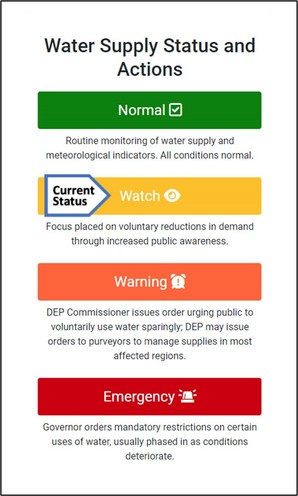New Jersey Commissioner of Environmental Protection Shawn M. LaTourette today issued a statewide drought watch and is urging residents and businesses to conserve water as persistent dry and hot conditions continue to stress water supplies throughout the state.
The commissioner's declaration of a drought watch is the first in the state's three-stage drought advisory system. The watch is intended to sow public awareness and appreciation of the stress upon water supply sources and encourage voluntary water conservation measures. If conditions do not improve, declaration of a drought warning or a drought emergency with mandatory water use restrictions may become necessary. Voluntary conservation measures at the watch stage can help to avoid more serious and restrictive drought conditions.
 Stream flow and ground water levels are falling below normal for most of the state and some reservoirs are showing steep rates of decline as hot and dry conditions continue, LaTourette said in a release. While water conservation is always important, it becomes critical during prolonged dry and hot periods like New Jersey has been experiencing. If residents and businesses do all they can to reduce water demand, together we can ensure ample supplies in the coming weeks and months.
Stream flow and ground water levels are falling below normal for most of the state and some reservoirs are showing steep rates of decline as hot and dry conditions continue, LaTourette said in a release. While water conservation is always important, it becomes critical during prolonged dry and hot periods like New Jersey has been experiencing. If residents and businesses do all they can to reduce water demand, together we can ensure ample supplies in the coming weeks and months.
At this time of year, more than 30% of water demand in suburban areas is for outdoor purposes, much of which can be reduced or avoided. The public can make a big difference by reducing watering of lawns and landscaping, reducing the washing of vehicles, and cutting back nonessential uses such as hosing off driveways and sidewalks. Residents and businesses can also practice many conservation measures to reduce indoor water use.
For more water conservation tips, visit https://dep.nj.gov/conserve-water/
The DEP is continuing to closely monitor drought indicators, which include precipitation, stream flows, reservoir levels, ground water levels, and water demand. DEP will continue to inform the public, local governments, and water systems of future actions to mitigate the risk of more severe conditions.
The most up-to-date information about the status of New Jersey's water supplies can be found at dep.nj.gov/drought.